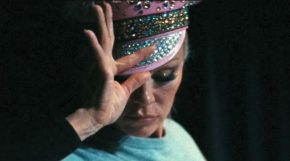In this welfare-based part of the world where I write these words, we are experiencing a special and unusual case. Namely: the border of youth is pushing forward as we age. I have been hearing for almost two decades now: “don’t worry, you’re still so young”, and anyway, 40 is the new 30, 70 is the new 60. Also, youth is quite relative. For a grandparent, not only the grandchild but their parent is a ‘child’, and if a profession has its masters, “the wise old”, we can learn from them at any age.
When Richard Strauss wrote his Serenade, he was 17. It was considered to be very young in the 19th century already, let alone today. Perhaps that is the reason why the Peter Eötvös Contemporary Music Foundation chose this piece when asking this year’s mentees: use it as an inspiration, and write your own work for wind instruments! Balázs Kecskés D. and Francisco Domínguez were both born in 1993, and although they have been in this profession for years, we can still call them young composers. Just like Martin Rajna, born in 1995, and Jonas Bürgin, born in 1996, are young conductors: they are also mentored by the foundation and will conduct the upcoming concert on 14 October at the Liszt Fest.

A colleague wrote about the music of Balázs Kecskés D.:
“…he depicts daydreaming calmness like Debussy, with a great sense for enchanting moment with made with his ethereal music.”
We could expect something like that from his piece Wind, which will have its world premiere at the concert mentioned above. Balázs Kecskés D. studied in the Bartók Conservatory and the Liszt Academy of Music, and visited a lot of master’s courses, went on excursions, composed many pieces and won a few prizes. He was among the best at a composing competition with 18, and last year he wasn’t only chosen to be an Eötvös mentee but won the prestigious Hungarian awards Junior Prima and Junior Artisjus. In his music, he mixes experiences of centuries with contemporary impressions, ‘from Franz Schubert to Katy Perry’, but his secret lies mostly in his ability to create a unique sound of all the impressions.
Francisco Domínguez was born in Spain and started his studies at the institution called Musikene. He continued at the Graz University of Arts, and his career was also not without master’s courses and prizes. Among his works, we find some which he wrote when he was 19, and ever since he has composed plenty, from orchestra pieces to electroacoustics. His connection to the Eötvös Foundation started in 2016 already when he attended their academy, taught by Péter Eötvös himself alongside Toshio Hosokawa. In the same year, Eötvös recommended him for an artistic scholarship: he could live and compose in a Tuscan village for months. No surprise, then, that he was also elected into the mentor programme, which resulted in his piece Kharir IV.

And who are the “old wise masters” of this mentor programme? Main organisers Péter Eötvös and Gergely Vajda invite a guest to join them every year. This year, Greek composer Georges Aperghis was chosen, who creates experimental theatre music, non-programmatic chamber music, but also special treasures like music versions of theoretical texts from the fields of psychology and anthropology. Recently, he has read recollections written by migrants; that provided the basis for Migrants which – just like Aurora by Péter Eötvös – will be premiered in Hungary on 14 October.
“I visited composers with my work tucked under my arm. And that’s how I met Iannis Xenakis.”
This is how Aperghis tells the story of meeting his mentor at the age of 17. A life-changing moment for him – and most probably, the group Kecskés D.-Domínguez-Rajna-Bürgin have also experienced some such moments during their time as Eötvös Foundation mentees in the last couple of months.



























Comments